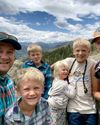
There is a word in hebrew for people like me, those who choose to leave their country and move to Israel: We are called olim, from the word la’alot, meaning to rise or “go up” to the land. We step into the unknown, away from our family and friends, our jobs, our comforts and our mother tongues to fulfill the destiny God promised Abraham and his descendants.
Almost 30 years ago, my husband, Jeff, and I left Maryland and moved to the southern city of Beer Sheva, the cultural capital of the Negev desert. Jeff’s sister had moved there several years earlier, and what she told us about life in Israel spoke to a longing in our souls.
We were in our twenties, seeking something we hadn’t been able to find anywhere else—a spiritual belonging. We wanted to feel closer to God and be among other religious Jews.
That didn’t mean leaving everything we knew behind would be easy. Trekking halfway around the world to start a new life, becoming impoverished in a second language.… We’re like Abraham himself, I thought.
Abraham had journeyed to what is now Beer Sheva, led only by God’s calling. Had our patriarch been as nervous as we were? He struggled to make a life. When locals stole from the wells that Abraham had built, he was forced to confront the Philistine king Abimelech. The two men swore an oath that Abraham owned the wells, and the oath was sealed when Abraham gave Abimelech seven ewes. That’s how Beer Sheva got its name, be’er meaning “well,” and sheva meaning both “oath” and “seven.”
この記事は Guideposts の August 2020 版に掲載されています。
7 日間の Magzter GOLD 無料トライアルを開始して、何千もの厳選されたプレミアム ストーリー、9,000 以上の雑誌や新聞にアクセスしてください。
すでに購読者です ? サインイン
この記事は Guideposts の August 2020 版に掲載されています。
7 日間の Magzter GOLD 無料トライアルを開始して、何千もの厳選されたプレミアム ストーリー、9,000 以上の雑誌や新聞にアクセスしてください。
すでに購読者です? サインイン

What prayer can do
POWER IN OUR DAY-TO-DAY LIVES

Rejoice in All Things
My husband and I had an annual tradition of celebrating the high points of the year. This time, he wanted to try something different

Special Delivery
A month after my wife died and my life felt so empty, the only thing I had to look forward to was Amazon

A Prayer for Cullen
Even in a family crisis, I had trouble quieting my mind enough to listen for God

Blackie & Rosebud
What would happen to my friend's cats now that she was gone?

The Kids Are Alright
My twin boys and I had always been close. I thought they needed me. Now I wasn't so sure

Kindred Spirits
I thought the nose ring gave it away—she was just another teenager. I couldn't imagine how she could help me

A Boy Named Sue
In 1969, Johnny Cash and his wife, June, threw a party at their house in Hendersonville, Tennessee, a “guitar pull,” where guests passed around a guitar and tried out new songs.

Active Duty
I'd tried everything for my knee - physical therapy, gel injections, a cumbersome brace. Everything except prayer

Living an Abundant Life
A conversation with spirituality and health researcher Harold G. Koenig, M.D., on what makes people truly happy